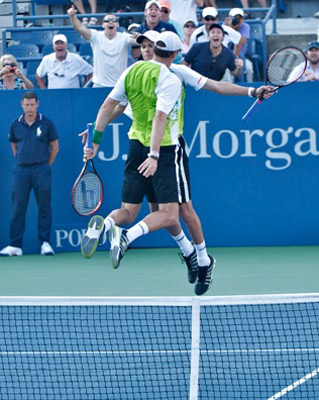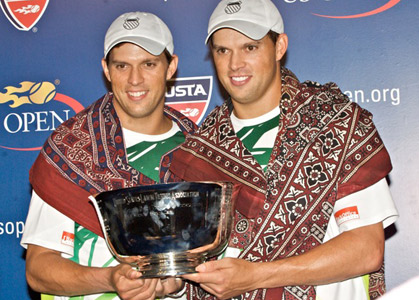80A561C9-9FA8-4421-8568-32ACF7A19E00
By Richard Pagliaro
© Andy Kentla
(September 10, 2010) The net divides the court like a nylon wall, but resembled a bridge bringing two teams, three nations, more than 20,000 fans and an often overlooked form of tennis together today. In a high-quality clash between dynamic doubles duos, Bob Bryan and Mike Bryan beat India's Rohan Bopanna and Pakistan's Aisam-Ul-Haq Qureshi, 7-6(5), 7-6(4) to capture their third US Open championship and ninth Grand Slam title before an appreciative Arthur Ashe Stadium crowd that gave all four men a rousing ovation at the conclusion of a memorable match.
Facing mini-break deficits in both tie breakers, the Bryans bumped up their level of play when it mattered most.
"I think today we were phenomenal. I mean, there was a 50 miles an hour wind coming down the court, and I thought we were seeing the ball great," Bob Bryan said. "It's awesome when you can see the finish line. There's one more match to go. You could leave it all on the line. That's what kept pushing us forward. You don't think about being down a mini break in a finals of a Grand Slam."

They own two of the fastest sets of hands in tennis — so fast they could jointly juggle jagged bits of broken baseball bats without concern of contracting splinters — but by the end of this encounter, the twins had their hands full at net and were at a temporary loss for a reply.
That moment came after the Bryan brothers played what they called one of the best matches of their professional careers as they leaped into each other's arms after an ace ended the match. Father Wayne Bryan, the twins' first coach and long-time doubles promoter who rarely attends his sons matches because he gets too nervous watching them play, leaped out of his seat simultaneously in an eruption of emotion.
In a season in which the Bryan brothers broke the record for most Tour-level doubles titles in the Open Era when they captured their 62nd title in Los Angeles in July, they now stand behind the Woodies, Todd Woodbridge and Mark Woodforde, for most major titles in the Open Era. The Woodies on 11 major titles together and the Bryans are on pace to shatter that mark if they stay healthy.
The net divides the court, but two become one when Bopanna and Qureshi share the doubles court. Sport serves as a source of unity as Bopanna, born in Bangalore, India, and Qureshi, from Lahore, Pakistan have reached an accord on court that contrasts with the agitation that can exist between their neighboring nations.
The pair have become promoters of peace and in a gesture larger than tennis Qureshi took time out during the trophy presentation to reiterate the message he and Bopanna have share throughout their partnership: they spend their professional lives striking shots, but peace is their ultimate aim.
"Since September 11, every time I come to the States or western countries I feel people have wrong impression about Pakistan as a terrorist nation," Quershi said. "I just wanted to declare that we are very friendly, loving, and caring people, and we want peace in this world as much as Americans want and the rest of the world wants. We all on the same side."
Those sentiments struck a chord in his opponents.
"It choked me up. I could see him; he was quivering a little bit," Bob Bryan said. "Just to give that message to everyone was very heartfelt."
Both Indian and Pakistani fans sat side-by-side cheering on the pair, the Indian and Pakistani ambassadors to the United Nations sat in adjacent seats and after the match, the Pakistani ambassador presented the Bryan brothers with matching traditional scarves made from ancient cloth as a show of appreciation for the donation the twins made to help victims of the floods in Pakistan.
"When it comes down to it, a lot of people in Pakistan who don't have homes and are out on the street. What they're doing to bring India and Pakistan together is pretty special," Mike Bryan said. "A sport can bring people together."

It was one of the rare moments when the action after a final was even more profound than the play itself.
"What they are doing is a lot more important than winning the US Open," Bob Bryan said.
At a time when religious and political extremes can create so much diviseness in the world can two men running around in shorts smacking felt sphere over a net truly make any impact?
Winning doubles demands cooperation, communication, mutual respect and shared problem solving — the very qualities people are sometimes resistant to apply in rallies of rhetoric.
On changeovers during their early-round matches, Bopanna and Qureshi watched with joy as the United Nations ambassadors to their respective nationsl shared smiles and conversation giving both men a glimmer of hope that while tennis can't solve complex international issues it might just start a dialogue
"We always said sports can reach places where no religion or politics or politician can reach. I think it's above all the religion and politics," Qureshi said. "Seeing both ambassadors sitting together and going for one cause obviously is a start. So I would take it in a positive way. And like Rohan says all the time: If you can change few personal people's mind on Indian or Pakistan's side, I think it's a great thing."
The unity the two men exhibit on court is being reflect back at them at the mixed crowds they saw at their US Open matches.
"Crowd is getting better. More Indians and Pakistanis coming. They're all mixed together sitting in the crowd. You can't tell who is Pakistani and who is Indian," Qureshi said. "That's the beauty about sports. That's the beauty about, I guess, our playing. Before our pairing you would never see that in any sports, fighting for one cause. It's really good to be part of it."
Competing for a cause binds both teams together.
Five years ago, the Bryan brothers, their father Wayne and several of tennis' top doubles stars, including Mark Knowles and Mahesh Bhupathi sat in interview room one inside Arthur Ashe Stadium explaining why they were filing a lawsuit against the ATP.
The lawsuit, which was filed on September 1st, 2005, alleged that the ATP's experimental efforts to "enhance" doubles competition was in fact a concerted effort by tournament directors to diminish and eventually eliminate doubles players' ability to gain entry into main draws as a cost-cutting measure to save the tournament's money.
"There is no credibility left for the ATP," Knowles said that day. "They are basically trying to annihilate one form of the game, which is doubles.."
Essentially, the players sued the very union that was created to represent them and asserted the ATP was placing the interests of tournament directors above its own players when it came to doubles.
"Five years ago we were sitting in this room giving a press conference on trying to save doubles," Mike Bryan said. "It was on its way out. My dad worked behind the scenes for about a year and got it done, and with a lot of top players. Now doubles is strong. I mean, right out there it was just a packed house for a couple of doubles teams.That was the best atmosphere. That's a TV match, which is huge. So I mean, we're very happy that we've been able to help doubles out."
The twins from Camarillo, California went on to win the Open the week after the lawsuit to become the first brothers to lift the U.S. Open doubles title trophy since 1924 when the Kinsey brothers, Howard and Robert, accomplished the feat.
The Bryans believed they saved their best tennis for the final; some observers believe they saved much more that that.
"Doubles seems to have been on life support for so long," said Hall of Famer John McEnroe, widely regarded as perhaps the finest doubles player of the Open Era. "The Bryan brothers play with so much energy and enthusiasm for the game. They seem to be singlehandedly saving doubles."